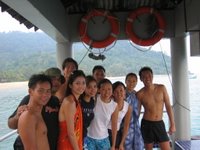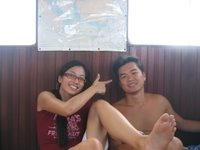Tuesday, March 14, 2006
EXPERIENCE UNDER THE SEA!
What Inspired MeWhen I was a little girl, I loved the animated film/movie, ‘The Little Mermaid’. In fact, the song that leave the deepest impression in me was ‘Under The Sea’. Since then, I have always yearned to experience how the life would be like underwater-- under the sea. Like I always say, “The sounds of the waves calms me, tranquility & peace it brings to my soul, the deep blue water – mysteriously intrigue me.
My Learning Experience
In May 2004, I took the open water diver course with a PADI certified/recognized dive shop -- Aquaterra Adventures.(Aquaterra Adventures back then was spearheaded by Andy Yap and his partner.) I was recommended by my girlfriend, who previously dived with them. Her feedback about the instructor was that he had good interaction with students, understanding & being patient with the needs & pace of students, excellent small group ratio. Above all, she chirped that the instructor was good-looking. *coughs*
Note: Package prices and contents are dependent or vary with different dive operatorsMy Lesson Learnt #1: Log your Dives—for future reference.
Now that I try to recollect I realized that logging of dives are important. I didn’t quite do that for my open water trip. Hence, I feel quite lost upon recall. Anyway, it is not just about logging usual stuff such as the duration of dives, the amount of air you use, the dive sites or even who your dive buddy was.
In fact, my log book over time has developed to include information: my feelings pre-during-post dive, the depth of dive which it occurred, type of dive (leisure, day, night, deep, wreck, etc), type of entry from boat(giant stride, back roll), equipment worn/carried, marine life spotted/recognised, etc.
Basically, a log book caters to your individual needs. Whichever the case, remember to log your dives!
My Lesson Learnt #2: Swimming versus Diving
Ok, I swim. Occasionally. BUT… I am not a fantastic swimmer. Don’t worry if you can’t swim for nuts. Being able to swim will give you more confidence as oppose to a non-swimmer. But divers are encouraged to learn to swim which will come in useful especially when you further your diving education –just like me! Honestly, be it swimming on the surface or underwater, it is all about buoyancy a.k.a. your ability to float (in my terms la!) underwater.
My Lesson Learnt #3: Do your homework(shop/instructor/etc) before making your decision.
It is important to do research a.k.a find out information of the dive shops/operators. Irregardless of the methods such as internet surfing, calling the respective dive centres/operators, through talking to people, listening/reading what or how their experiences were like, quality of services versus price of packages were definitely useful in helping me make my decision.
Instructors play a part in our growth and learning as a diver. Hence it is important not just to do homework about the shops and services, but also to know the people running/conducting the courses. Methods used would be the same. Information such as their backgrounds, the feedback from previous customers, etc would be a good reference.
Ultimately, personality of instructor and the instructor:student ratio is what I see as one of the most important factors in my decision making.
**Sometimes, it does not necessarily mean that the biggest dive shop.operator is the best dive shop around. Look at their ranking e.g. 1 star PADI dive centre versus 5 star PADI dive centre is one way. Honestly, everyone has their vibes and preferences.
My Lesson Learnt #4: PADI/SSI/MAUI/etc
Why did I choose PADI? According to my research (using my usual various methods), I found that PADI is recognized worldwide. Besides this, PADI has the most number of certified dive centres around the world. As a diver, this would mean that whichever part of the world I travel to, the most likely dive centre and dive membership to be recognised is PADI. Of course, during your course of travel, you must remember to bring your PADI membership card and your log book (to show the number of dives you have clocked and you made any dives recently). Ok. PADI + Travel for dive trips are another topic by itself, so I shall not dwell into that. Just remember to ask the questions before getting certified.
Continuing…My Advance Cert.
In June 2004, I went to conquer my advance diver course. The mechanics/lessons learnt of who you dive with, where you dive, etc is the same as of above. *winks*Of course there are new skills to learn such as: navigation underwater (use of compass in forms of square, triangle, etc and number of fin cycles)—which I can be confused at times, even until today. *coughs* So much for my sense of direction. *faints* further test of skills in buoyancy e.g. hovering – which I only managed to understand fully and perform competently after many many dives after certification, highly anticipated, night diving! *squeals* Last but not least, one my favourite… deep diving of up to 40m (depth).
In conclusion, the difference between open water certified diver versus advance certified diver is the recreational depth that you are allowed to dive. 15m VS 40m. The fact of life is that if you do have plans to continue diving leisurely in local waters or overseas, being an advance water diver has its advantages – e.g. only certain marine life can be seen at certain depth. Or certain dive sites such as wreck dives can only be visited at depth of 30+ to 40+ metres. So, my advice? Go for your advance la! *laughs*
My Lesson Learnt #5: Drink plenty of water, re-hydrate after every dive.
Diving is also a form of strenuous exercise, you are also perspiring underwater. Thus drink plenty of water during the trips, be it before and/or after your dives. I cannot stress enough the importance to be hydrated.My Lesson Learnt #6: The people on the trip with you make a difference
Having the right company with you to go on any dive trips is important. They are the ones that you have to face throughout the trip. Yes, I do recognize that there are people whom you can get along or can’t get along. Heck. Just be with people that you are comfortable with. Imagine. You wouldn’t want to be stuck underwater with someone, or a buddy who you are uncomfortable with right? No place to run you know… *deep in thoughts*
My Journey
Between June 2004 to End April 2005, time was not on my side. I did not dive for almost 1 year. However, since I started again in May 2005, I have dived not just with Aquaterra Adventures (Andy), Gill Divers (Jacki), and last but not least my current group, Absolute Scuba (Martin and Roy). Besides them, I have had opportunities to follow leisure divers from other dive shops such as 51 Scuba (Dennis), and many more. *coughs & grins*
I continued to dive bi-monthly, sometimes 3x per month. Places that I have dived include Redang (Kalong), Tioman (Genting and Salang), Aur and my favourite Dayang Island. In fact, a big bulk of my dives were done at Dayang. This is the place where I continuously honed my skills and even picked up new skills, i.e. Buoyancy, breathing techniques, usage of weights for each dive understanding and recognizing marine life. Recognizing landscapes and improving my navigation. Improved in details of my log book leisure underwater photography skills. Getting use to the usage of my own set of dive gears.
To date, I have clocked more than 60 leisure dives in a short period of 6 months from May 2005. In addition, through a lot of hard work and overcoming fears cum obstacles, I am finally a rescue diver.
Future Direction
Having the basic skills up to the level of rescue diver, I continuously seek to keep my skills abreast through practice, and readings. The next step for me, naturally would be to be a dive master. However, at this juncture, I am not inclined to move to that level. After all, for now, I see myself as a sports diver and hope to travel to dive around the world. Ideally, I would like to conquer diving in Asia as Tropical countries are one of the best places to dive.










